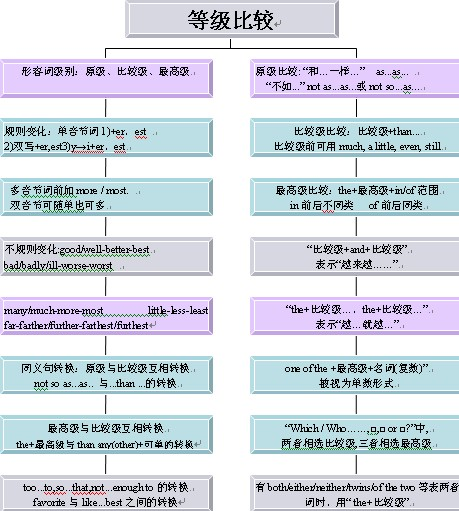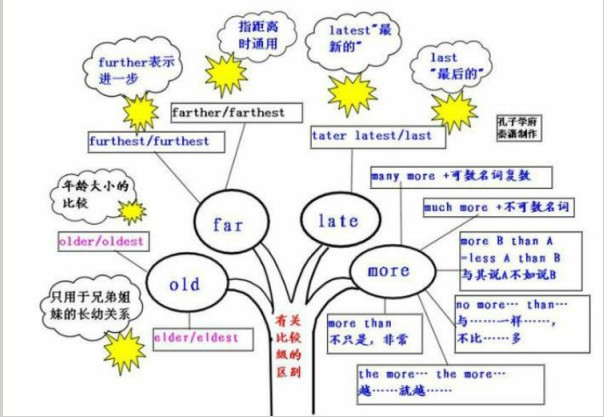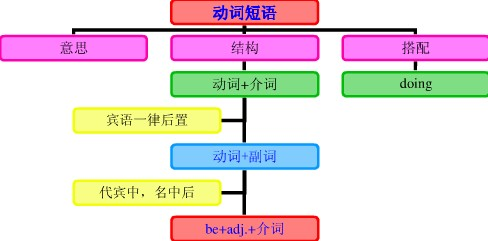本试题 “You have _____. You spent _____ you did last time. A. made a progress; as less time asB. had a progress; fewer time thanC. made progress; less time...” 主要考查您对形容词的比较级
动词短语
等考点的理解。关于这些考点您可以点击下面的选项卡查看详细档案。
- 形容词的比较级
- 动词短语
形容词比较级概念:
大多数形容词(性质形容词)有比较级,用来表示两个人或事物之间的比较“较……”。
如:I am taller than you.
形容词比较级特殊用法:
1、没有比较对象的比较结构:
所谓没有比较对象的比较结构不是指省略而言,而是指并非真正的比较。
例如:The car runs faster than110 miles. 那辆车时速为110多英里。
There is more than one solution to the problem. 这个问题的解决办法不止一个。
The daily cost in an average hospital in the United States can run as high as $250. 在美国普通医院的每天的费用可高达250美元。
2、用比较级的形式表达最高级的意思:
在这种情况下,往往是将一个人或是一件事与其他所有的人或事相比较。注意别忘了常在比较状语中用any, other, else类的字眼,以将比较主体排除在比较对象以外,因为自己不可以与自己相比较。
例如:He is taller than any one else in our class. 他在我们班比其他任何都高。
Iron is more useful than any other metals. 铁比其他任何金属更有作用。
3、no+比较级+than的结构表示“A和B一样不……”:
例如:She runs no faster than her sister.她与她妹妹一样跑不快。
Tom is no wiser than John. 汤姆和约翰一样没有聪明才智。
He is no richer than his brother. 他与他弟弟一样不富有。
4、汉语可以说“昆明的气候比兰州好”。英语必须加that:
例如:The climate of Kunming is better than that of Lanzhou.
5、英语比较级常译作“较…”、“…一些”等,但不等于汉语的“更…”。汉语的“更…”须用“still”或“even”来表示:
如:This book is even more difficult than that one. 这本书比那本书更难。
6、有些情况下,汉语不用“较”等字眼,英语则须用比较级:
如:Will the younger people give their seats to old people? 请年轻人把座位让给老年人好不好?
形容词比较级的用法:
1、比较级用于二者的比较,其结构是:含有形容词比较级的主句+从属连词than引导的从句(从句中常省去意义上和主句相同的部分)。
如:Li is older than Zhou. 李比周年纪大。(从句中省去了is old)
There are more children in this nursey than in that one. 这个托儿所的孩子比那个托儿所多。(从句中省去了there are children)
After two years' physical training, she is healthier and stronger. 经过两年的体力锻炼,她(比以前)健康强壮多了。(注意这里省去了从句than she was)
We are much better off than ever before. 我们的生活比过去任何时候都要好得多。(than后省去了we were)
Paul weighs less than harry. 保尔的体重比哈利轻。
Mary is less clever than Jane. 玛丽不如简那么聪明。
2、可修饰比较级的词:
1)a bit, a little, rather, much, far, by far, many, a lot, lots, a great deal, any, still, even等
2)还可以用表示倍数的词或度量名词作修饰语。
3)以上词(除by far)外,必须置于比较级形容词或副词的前面。
典型例题:
1)—Are you feeling ____?
—Yes,I'm fine now.
A. any well
B. any better
C. quite good
D. quite better
答案:B. any可修饰比较级,quite修饰原级,well的比较级为better.
2)The experiment was____easier than we had expected.
A. more
B. muchmore
C. much
D. moremuch
答案:C. much可修饰比较级,因此B,C都说得通,但easier本身已是比较级,不需more,因此C为正确答案。
3)If there were no examinations, we should have___at school.
A. the happiest time
B. a more happier time
C. much happiest time
D. a much happier time
答案:D.
注:many, old和far用法:
1)如果后接名词时,much more+不可数名词 many more+可数名词复数
2)old有两种比较级和最高级形式:older/oldest和elder/eldest。elder,eldest只用于兄弟姐妹的长幼关系。
如:My elder brother is an engineer.
3)far有两种比较级,farther,further在英语中两者都可指距离。在美语中,father表示距离,further表示进一步。
如:I have nothing further to say.
3、比较级中的两个特殊作用的结构:
1)The+比较级+句子,表示的意义是“越(怎么样就)越(怎么样)”,在这个结构中的两个“比较级”不要求一定词性相同,它们各自的词性要依句子的需要而定;
2)和比较级+and+比较级。表示的意义是“越来越(怎么样)”,在这个结构中的两个“比较级”则要求词性相同。
例如:The harder you work at your study, the better academicrecords you will have. 你学习越努力,你的成绩就越好。
The more we have, the more we want. 人欲无穷。
When winter is coming, it gets colder and colder. 冬天来临之际,天越来越冷了。
He became less and less satisfied with the foot ball team's performance. 他对足球队的表现越来越不满意了。
形容词比较等级知识体系:

特殊形容词比较级变化:

动词短语的概念:
动词常和某些其他词类用在一起,构成固定词组,形成所谓短语动词(phrasalverb)。和动词一样,短语动词也可分为及物和不及物两种。短语动词可以作为一个整体看待,同一般动词一样使用。
动词短语的搭配类型:
1)动词+介词:这类短语动词用作及物动词,后面须跟宾语。
如:The small boy insisted on going with his parents. 那男孩坚持要跟父母一起去。
Do you often listen to broadcasts in English? 你常听英语广播吗?
Look at the children. Aren't they lovely? 看着这些孩子们。他们多么可爱呀!
We stand for self-reliance. 我们是主张自力更生的。
这一类的短语动词还有很多,如depend on(upon)(依靠),wait on(服侍),look for(寻找),deal with(对待),look after(照料),wait for(等待)等。
2)动词+副词:
这类短语动词有的用作及物动词,有的用作不及物动词。
如:I always get up as soon as the bell rings. 我总是一打铃就起床。(不及物)
Look out, there's a car coming! 当心,来汽车了!(不及物)
Have you handed in your exercises already? 你已经交练习了吗?(及物)
Please don't forget to put on your coat, it's cold outside. 请不要忘记穿外衣,外面很冷。(及物)
这一类的短语动词还有很多,及物如put out(扑灭),eat up(吃光),put down(放下);不及物如set off(出发),come up(走近),go on(继续)。
注:"动词+副词"这类短语动词和上面第一类"动词+介词"的不同之处在于:"动词+介词"用作及物动词,后面须跟宾语。"动词+副词"则有的及物,有的不及物;用作及物动词而宾语为人称代词或自身代词时,副词往往放在宾语之后。
如:Please wake me up at five tomorrow. 请在明天早上五点唤醒我。
If you have done your exercises, please hand them in. 如果你们练习做完了请交来。
She doesn't normally behave like that, she's putting it on. 她通常并不如此表现,她是装出来的。
注:这类短语动词有不少可兼作及物和不及物动词用。
如:He took off his hat when he entered the office. 他进办公室后脱下帽子。(及物)
The plane took off at seven sharp. 飞机在七点整起飞。(不及物)
Charlie rang up Neil to ask about the time of the meeting. 查理打电话给尼尔问开会的时间。(及物)
If you can't come, please ring up and let us know. 你如来不了,请来电话告诉我们一声。(不及物)
3)动词+副词+介词:
"动词+副词"之后有的可以再加一个介词,形成另一种短语动词。这类短语动词用作及物动词。
如:Do not give up hope. We must go on with the experiment 不要失望。我们必须继续试验。(go on with继续)
He came up to me. 他走到我跟前。(come up to走近)
这类短语动词还有:look down upon(看不起),do away with(去掉),put up with(忍受)等。
4)动词+名词+介词:
这类短语动词也是及物的。
如:He shook hands with all the guests at the banquet. 他在宴会上和宾客一一握手。
Young pioneers often come to the Children's Palace to take part in after school activities.少先队员经常到少年宫来参加课外活动。
Pay attention to the temperature of the stored rice. 注意仓库里的稻谷的温度。
Her job is taking care of the babies. 她的工作是照顾婴儿。
这一类短语动词还有:put an end to(结束),take notice of(注意),catch hold of(抓住),lose sight of(看不见),make use of(利用)等。
动词短语知识体系:

与“You have _____. You spent _____ you did last time. A. mad...”考查相似的试题有:
- —Our Chinese athletes achieved great success in Beijing Olympics.—Yes. In Asia, no one could perform ________, I thin...
- — How is everything going?— It couldn’t be _______, for I lost my wallet this morning.A.worseB.badC.goodD.better
- It was ___ weather we had ever had in the past ten years.A.worstB.the worseC.the worstD.worse
- News report say peace talks between the two countries _________with no agreement reached.A.have broken downB.have b...
- --- What are the workers talking about ?--- They are discussing the idea the old worker ______ at the meeting yesterd...
- Thomas Alva Edison didn’t “invent” the light bulb (灯泡), but rather he ______ a 50 –year –old idea, which is not wel...
- You’re watching TV? You’re ___to be cleaning your own room.A.knownB.supposedC.regardedD.considered
- I spoke to him kindly ________ him .A.not to frightenB.in order to not frightenC.for not frighteningD.so as not t...
- It is helpful for children to form a good habit by asking them to _____ all the toys after they finish playing.A.put...
- When I was in danger, a bright idea suddenly ____ to me.A.happenedB.hitC.struckD.occurred